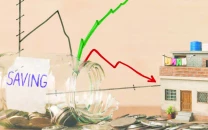The unparalleled growth of the services sector
Unlike common perceptions Pakistan is neither an agri economy nor industrial, but services based.

The unparalleled growth of the services sector
This is not to say that agriculture or industry have no role or future in Pakistan, far from it, but it does show how the services industry has latched on to the spending boom and catapulted itself to the top of the food-chain, literally. The bulk of the companies on the list are oil marketing companies. I am not sure what to infer from this. The oil marketing companies here are big because we have a power demand or they are so big and still we have a power shortfall?
This should really come as no surprise considering the fact that the services sector is the largest and fastest growing sector in the world economy, accounting for the largest share in total output and employment in most developed countries. The average share of the services sector in total GDP is 47% in low income countries, 53% in middle income countries and 73% in high income countries.
The sector now accounts for 69% of global output, 35% of global employment and nearly 20% of global trade. The value of services in world exports has increased 41.7% whereas the value of goods has increased just 35.5% from 1975 to 2005. Since then the trend has been even more acute.
Over the last few decades, the structure of the Pakistan economy has experienced significant changes. An analysis shows that the share of agriculture has been declining gradually over time from 43.6% in 1960-61 to 21.5% of GDP in 2009-10, and share of industry has increased from 15.6% in 1960-61 to 25.2% of GDP in 2009-10. The share of service sector has increased from 39% of GDP in 1960-61 to 53.3% of GDP in 2009-10, therefore the service sector is the largest contributor to the GDP of Pakistan.
Cross country data reveals that structural transformation of most countries has been multi-stage. In the first stage of transformation, the decline in the share of the agriculture sector has been seen to be compensated by an almost equal increase in industry, whereas share of services sector has remained stagnant. In the second stage of economic growth, substitution has mostly taken place between industry and services while agriculture has remained constant. This implies that the services sector has in most cases gained momentum at the expense of agriculture.
In case of Pakistan, the share of services is increasing in all sectors of the economy. In fact, the growth rate of services sector is higher than the growth rate of agriculture and the industrial sector and it now accounts for one third of total employment. It also provides essential inputs to the agriculture sector and the manufacturing sector.
It is because of its strong linkages with other sectors of the economy that the growth of the services sector can be taken as an indicator of the strong potential for overall economic growth.
Published in The Express Tribune, December 24th, 2012.


















COMMENTS
Comments are moderated and generally will be posted if they are on-topic and not abusive.
For more information, please see our Comments FAQ